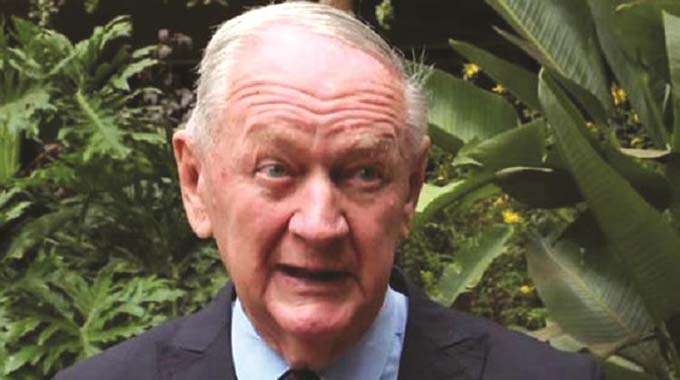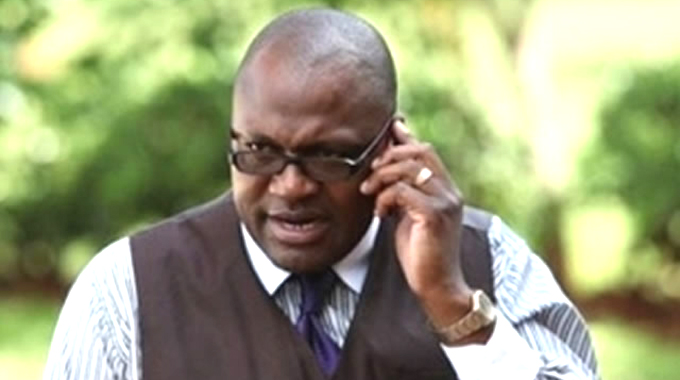‘New notes will not fuel inflation’

Reserve Bank of Zimbabwe (RBZ) Governor Dr John Mangudya recently announced that the apex bank was going to issue new bank notes and coins in $5 and $2 denominations to ease the shortage of physical cash. The cash squeeze had resulted in the public being charged premiums of up to 60 percent when seeking cash from moneychangers.
Further, the shortage of physical cash resulted in multi-tier pricing, with those using cash enjoying a considerable discount. The central bank has said it will gradually inject about $1 billion cash over the next six months to address the shortages of physical cash. From Monday next week, the RBZ will issue $2 bond coins, before issuing the notes in the near future. Our reporter, Linda Muriro (LM), this week spoke to two economic commentators, Mr Eddie Cross (EC) and Dr Gift Mugano (GM) on Zimpapers radio station Star FM to get their perspectives on the new notes and coins. Excerpts . . .
LM: Some sections of the media have suggested that Zimbabwe is going to introduce a new domestic currency. What is the correct position?
EC: I think listeners will remember that we had a situation where last month, the Reserve Bank issued instructions that mobile money agents were to stop selling cash for a premium and they tried to curtail the activities of EcoCash in the market place and I was asked a question by ZTV as to whether I thought that was a good thing or a bad thing. I said it was a wrong solution for a problem whose real solution was to provide more cash for transaction purposes. I recalled that in August, the President had said we were going to have a new currency in November and I said that would be a solution and I still believe that. When the Monetary Policy Committee met last week, one of the things we agreed to do was to authorise the release of several hundred million dollars of new cash notes into the market immediately. That will be done in the next few days. I don’t think it will contribute to inflation because we are going to insist that this new cash is purchased by the banks themselves prior to release.
LM: So is this a new currency or these are just notes? Also tell us the difference between a new currency and the introduction of new notes?
EC: When they introduced the bond notes, the Reserve Bank Governor was at pains to say that this was not a currency. Now, technically he was not right, that was incorrect because it is a currency. It’s cash. You can use it to buy goods and services, therefore it is a means for exchange. All that we are doing is to inject into the market, more of paper currency which looks just like the bond note. I think the only difference between the bond note and the new notes will be the absence of the word “bond note” on the face of the currency. They will look exactly the same as the old bond notes but, in fact, they will be slightly different in terms of what’s on the face.
LM: So this is a new currency?
EC: It’s not a new currency, it’s additional cash.
LM: Dr Mangudya has issued a public notice on the issuance of $2 bond coins as Mr Cross said and they come on Monday next week to circulate alongside the bond note. Can we safely say the Zimbabwean dollar, as pronounced in June, is the domestic currency given the reference to the word bond note or bond coin?
Dr Mugano: I think there is a bit of some confusion here. The new currency which was announced on 24 June is Zimbabwean dollars and it was at that point said it was going to work at 1:1 parity with RTGS and bond notes. So in my view, these new notes which are now coming into the market next week are the real Zimbabwe dollar. The first one, the bond note, was a currency but you cannot take it with the same features of a currency which we see in the region. It was kind of a bridging currency in my view. So these are just technicalities and jargon which we are using, but it’s the same thing we are using.
LM: So in your view, the new currency comes into effect next week?
GM: No, the new currency came into effect 24 June through a Statutory Instrument (142 of 2019) but what they are now doing is moving part of the electronic money, which is RTGS into notes and coins.
LM: Like you did mention, in June, Finance Minister Professor Mthuli Ncube stated that currency reforms were essentially over and that the only small thing left was introducing proper bank notes to replace the existing bond notes and coins. Is this it Dr Mugano?
GM: I don’t think you can say the reforms are completely over by injecting these notes and coins. First and foremost, yes the currency reforms include the exchange rate liberalisation, which was done 20 February and the banning of the multi-currency regime but to then say we have introduced $2 notes and coins and $5 and we have finished currency reforms, no. If we restrict printing of money, I think we are kind of misleading. As far as I am concerned, the currency reforms were over in June. The moment you introduce a new currency, I think you are done. What they are now doing is the logistics of making that available to the people by printing a number of denominations and at some point, one expects them to print higher denominations and you cannot then say when you are printing higher denominations, you are still doing currency reforms, I don’t think so. It’s technical jargon. The currency reforms include exchange rate liberalisation, moving from 1:1 to a free exchange rate, then also bringing in new currency. Those are the two elements of currency reforms.
LM: Mr Cross what really are the functions of the Monetary Policy Committee?
EC: With the MPC, it is not new. During the GNU in 2009, the Minister of Finance introduced reforms for the Reserve Bank to give it more independence and to make it more accountable. One of the features of that new Act was Section 29b which created the Monetary Policy Committee and that committee continued right through the GNU up to 2014 when the Minister of Finance who took over from Mr (Tendai) Biti, (Cde) Patrick Chinamasa, removed the provisions of the MPC from the Reserve Bank Act. What the President (Cde Mnangagwa) has now done is issue instructions that the section of the Reserve Bank Act has to be reinstated and the Minister of Finance will do that. The MPC is to take responsibility for monetary policy in the Reserve Bank. Nearly all the Reserve Banks in the world have them and they have far-reaching powers. I think as this new committee gets its feet on the table and it begins to exercise its role properly, I think the country will see considerably more stability.
LM: In your view, will the cash to be injected into circulation sufficient to meet demand?
GM: The question is to start by saying, what is money demand and supply? There is a bit of a challenge if you look at some areas which are not well in terms of technology like in the rural areas. I don’t think it will be enough to meet their demand and you need to take note that the central bank is talking about putting 10 percent to 15 percent of the total deposits. In my view, it’s correct from the theoretical framework in the books of economics but in Zimbabwe, we have an informal and formal economy. That 10 percent to 15 percent threshold works in a formalised economy like South Africa because there is financial inclusion. The only advantage that we have to date is because of the mobile money transfer, in particular, it has gone a long way to aid financial inclusion.









Comments